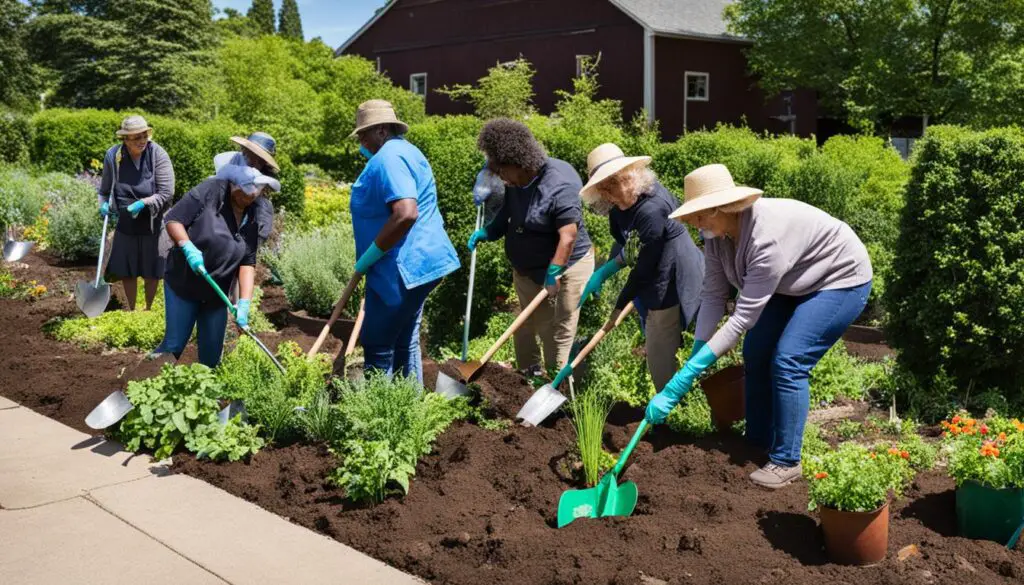Volunteering in a church setting is not just about lending a helping hand. It is an opportunity to make a real difference and nurture your faith. Engaging in church volunteer activities allows you to serve your community, grow spiritually, and inspire others to do the same. It is a chance to be part of something greater, to contribute to the well-being of others, and to fulfill the teachings of love and compassion.
Church volunteer opportunities come in various forms, ranging from assisting in Sunday services and outreach programs to participating in community service projects and special events. These initiatives aim to meet the needs of both the congregation and the wider community, providing support, care, and hope to those who need it most.
By engaging in church volunteer programs, you not only help others, but you also enrich your own life. The act of service brings a sense of purpose and fulfillment, allowing you to deepen your connection with your faith and make a positive impact on the lives of others. It is an opportunity to grow personally and spiritually, as you learn from the experiences and stories of those you serve.
Key Takeaways:
- Engaging in church volunteer activities allows you to make a real difference and nurture your faith.
- Volunteering in a church setting provides an opportunity to serve your community and grow spiritually.
- Church volunteer opportunities range from assisting in services to participating in community service projects.
- Volunteering enriches your life and brings a sense of purpose and fulfillment.
- By volunteering, you can make a positive impact on the lives of others and deepen your connection with your faith.
Cultivate a Culture of Service
Making volunteerism a pillar of your ministry’s culture is essential for engaging young volunteers in meaningful action and fostering a sense of volunteerism within the church community. By integrating volunteer opportunities into weekly gatherings and annual traditions, you can create a culture where serving others becomes a natural part of the church experience.
One effective way to cultivate a culture of service is by hosting family-friendly volunteering events. These events not only provide opportunities for young members to get involved but also introduce the concept of service to younger generations. By inviting the entire congregation to participate in these family-friendly activities, you can foster a spirit of service and community within the church.

Another strategy is to incorporate service projects that young members can tackle together. By creating opportunities for collaboration, you can make volunteering more appealing and enjoyable for youth. Encourage young volunteers to invite their friends and consider allowing outside community members to join in as well, creating a social atmosphere that encourages participation and strengthens relationships.
| Key Strategies to Cultivate a Culture of Service | Benefits |
|---|---|
| Integrate volunteer opportunities into weekly gatherings and annual traditions | – Engages young volunteers in consistent service – Makes volunteering a natural part of the church experience |
| Host family-friendly volunteering events | – Introduces service to younger generations – Fosters a spirit of service and community |
| Encourage collaboration on service projects | – Makes volunteering more appealing and enjoyable – Strengthens relationships among young volunteers |
By cultivating a culture of service within your ministry, you can inspire young volunteers to take meaningful action and make a lasting impact on the church community and beyond.
Foster Friendships
Creating meaningful connections and friendships is an essential aspect of engaging young volunteers in church activities. By providing opportunities for youth group members to work together on service projects, we can foster a sense of camaraderie and social connection among them. Encouraging young volunteers to invite their friends, and even welcoming outside community members to join in, can further enrich the social atmosphere of these activities.
When young people feel a sense of belonging and connection with their peers, they are more likely to actively participate in church volunteer activities. By organizing the projects in a way that enables them to tackle the tasks as a team, we can make the experience more enjoyable and appealing. This not only strengthens the bonds between group members but also creates a network of support and encouragement that can sustain their involvement in the long run.
“Volunteering together allows young people to develop friendships based on shared values and experiences, creating a positive and supportive community within the church.”
Additionally, fostering friendships among young volunteers can have a positive impact on their overall experience in the church. It allows them to develop friendships based on shared values and experiences, creating a positive and supportive community where they can grow together in their faith.
Benefits of fostering friendships in church volunteer activities:
- Enhances social connections and community within the church
- Makes volunteering more enjoyable and appealing to young people
- Cultivates a network of support and encouragement
- Strengthens bonds between youth group members
- Creates opportunities for personal growth and spiritual development

Offer Opportunities for Growth
One of the key benefits of involving young volunteers in church activities is the opportunity for their personal and spiritual growth. By participating in volunteer programs, youth can develop important life skills, cultivate a sense of responsibility, and deepen their faith.
Volunteering provides a platform for young individuals to discover and nurture their unique gifts and talents. Whether it’s organizing events, leading worship, or serving the community, each volunteer role offers a chance for personal growth and development. By engaging in meaningful service work, young people can learn valuable lessons about teamwork, leadership, and problem-solving.
Additionally, involving youth in volunteer activities allows them to experience the joy of making a positive impact on others. It helps foster a sense of purpose and fulfillment, contributing to their overall well-being. By recognizing and celebrating their accomplishments, church leaders can motivate young volunteers to continue their involvement and encourage others to join.
Creating Opportunities for Spiritual Growth
While the focus of volunteer programs is often on serving others, it is equally important to prioritize the spiritual growth of young volunteers. By integrating faith-based teachings and reflections into volunteer activities, church leaders can help youth connect their service work to their religious beliefs.
Engaging in volunteer activities provides young people with opportunities to put their faith into action, reinforcing their understanding of love, compassion, and service. By incorporating moments of prayer, scripture reading, and devotions into volunteer gatherings, youth can deepen their spiritual connection and develop a greater understanding of their Christian values.
By offering opportunities for growth, both personally and spiritually, churches can empower young volunteers to become active, engaged members of their community. Through their involvement, they not only contribute to the betterment of society but also nurture their own personal development and spiritual journey.
Involve Young Volunteers in the Process
Engaging young volunteers in church activities is crucial for their personal growth and the overall success of the volunteer program. By involving them in the decision-making process and allowing them to take ownership of projects, they become more invested and committed to their roles. This hands-on approach not only empowers young volunteers but also helps them develop essential skills and a deeper understanding of the church’s mission.
One effective way to involve young volunteers is by encouraging them to identify important issues within the community that they feel passionate about addressing. This could be anything from environmental sustainability to youth homelessness. By allowing them to choose a cause close to their hearts, they are more likely to be motivated and engaged in making a difference.
Once the cause has been identified, provide guidance and support as they develop plans of action. Encourage them to think critically and explore different strategies to address the issue. This process will not only strengthen their problem-solving skills but also foster collaboration and teamwork.

Invite Reflection
Reflection plays a crucial role in enhancing the volunteer experience and fostering a sense of accomplishment among young volunteers. Empowering them to see the difference they make and encouraging follow-up with service recipients can deepen their engagement and motivation. Allocating dedicated time for reflection during youth group gatherings provides an opportunity for volunteers to express their thoughts, emotions, and insights from their service experiences. Through thoughtful reflection, young volunteers can gain a deeper appreciation for the impact they have on others and develop a stronger sense of purpose in their volunteer work.
“Reflection is the lamp that illuminates the path for future service. It allows volunteers to connect their actions to their values and beliefs, providing a meaningful context for their service experiences.”
One effective way to invite reflection is by conducting volunteer engagement surveys. These surveys allow young volunteers to provide feedback on their experiences, express their needs and preferences, and share their suggestions for improvement. By listening to their feedback and adapting volunteer programs accordingly, church leaders can ensure that the volunteer experience remains relevant, engaging, and fulfilling. Volunteer engagement surveys also enable leaders to identify areas of growth and celebrate the successes of their volunteer initiatives.
Benefits of Reflection and Volunteer Engagement Surveys:
- Promotes self-awareness and personal growth
- Fosters a sense of meaning and purpose
- Strengthens the connection between service and faith
- Enhances volunteer retention and satisfaction
- Guides program improvement and strategic decision-making
By prioritizing reflection and incorporating volunteer engagement surveys into the church’s volunteer programs, leaders can create an environment that supports continuous growth, learning, and improvement. This not only benefits the young volunteers themselves but also contributes to the overall success and impact of the church’s volunteer efforts.

| Volunteer Engagement Survey Questions | Benefits of Reflective Practice |
|---|---|
| Did your volunteer experience meet your expectations? | Encourages self-reflection and evaluation |
| How did your volunteer work make you feel? | Promotes emotional awareness and empathy |
| Did you feel valued and appreciated as a volunteer? | Enhances volunteer satisfaction and retention |
| What impact do you believe your service had on the community? | Strengthens the connection between service and purpose |
| Do you have any suggestions for improving the volunteer program? | Guides program development and strategic decision-making |
Get Tech-Savvy
In today’s digital age, effective communication is key to engaging young volunteers in church activities. Utilizing social media platforms such as Instagram and Twitter can greatly enhance your ability to reach and connect with youth. By creating engaging content, sharing updates on upcoming volunteer opportunities, and highlighting success stories, you can generate excitement among young volunteers and encourage their active participation.
Text messaging has also emerged as a powerful tool for communicating with youth. Studies have shown that teens are more likely to respond to text messages than emails, making it a valuable channel for spreading the word about volunteer activities and gathering RSVPs.

To further streamline the volunteer process, consider utilizing volunteer management platforms and mobile apps. These tools make it easy for young volunteers to find and sign up for opportunities, track their hours, and stay informed about upcoming events. By leveraging technology, you can create a seamless and convenient experience for youth volunteers, increasing their overall engagement and satisfaction.
Remember, effective communication is crucial to keeping young volunteers informed and motivated. Embrace technology and explore different channels to connect with them where they are most active. By embracing digital platforms and tools, you can ensure that church volunteer activities resonate with young people and inspire them to make a positive impact.
Express Gratitude
Expressing gratitude to church volunteers is essential for recognizing their selfless efforts and making them feel appreciated. By showing appreciation, leaders can inspire and motivate volunteers to continue their dedicated service. Here are some volunteer appreciation ideas to express gratitude:
- Volunteer Appreciation Poems: Write heartfelt poems or find existing ones that convey gratitude and share them during church gatherings or through handwritten notes.
- Volunteer Appreciation Letters: Compose personalized letters expressing gratitude for the specific contributions and impact of each volunteer. Hand-deliver or mail these letters to make them feel valued.
- Celebration Dinners: Organize special dinners or events dedicated to celebrating and honoring the volunteers. Provide a platform for expressing gratitude and sharing stories of their impactful service.
- Volunteer Spotlights: Highlight individual volunteers or teams through volunteer spotlights in church newsletters, social media posts, or during church services. Share their stories and accomplishments to inspire others.
Remember, expressing gratitude should be sincere and meaningful. Tailor your appreciation efforts to the preferences and interests of your volunteers. Taking the time to acknowledge their dedication fosters a sense of belonging and encourages them to continue their service within the church community.
Table: Volunteer Appreciation Ideas
| Volunteer Appreciation Ideas | Description |
|---|---|
| Volunteer Appreciation Poems | Write or share poems that express gratitude for volunteers’ selfless efforts and meaningful impact. |
| Volunteer Appreciation Letters | Compose personalized letters to express gratitude for specific contributions and send them via mail or deliver them in person. |
| Celebration Dinners | Organize special dinners or events dedicated to celebrating and honoring the volunteers. |
| Volunteer Spotlights | Highlight individual volunteers or teams through spotlights in newsletters, social media, or during church services. |
Volunteer Engagement Should be Fun!
Volunteering in church activities should be a joyful and fulfilling experience for everyone involved. By celebrating small victories and infusing an atmosphere of joy, young volunteers can find their service both meaningful and enjoyable. Creating an environment where laughter and positivity thrive can inspire youth to continue their selfless efforts and deepen their connection with the church community.
One way to inspire joy in volunteer activities is by recognizing and celebrating small victories along the way. Whether it’s completing a successful fundraising event or seeing the positive impact of their service on others, acknowledging these achievements boosts morale and motivates young volunteers to keep making a difference. By highlighting the positive outcomes, volunteers are reminded of the impact they have and are encouraged to continue their dedication to church volunteer activities.
Another way to make volunteer engagement fun is through creative and interactive activities that bring laughter and joy to the experience. Incorporating games, team-building exercises, and friendly competitions into volunteer projects can foster a sense of camaraderie and create lasting memories. By infusing elements of fun into the volunteer process, young volunteers are more likely to stay engaged and enthusiastic about their service.
It’s important to remember that volunteering is not just about the work itself, but also about building relationships and nurturing a sense of community. Creating opportunities for young volunteers to connect with one another and build friendships can enhance the overall experience and make it more enjoyable. Whether it’s organizing social events, retreats, or group outings, fostering a sense of connection within the volunteer group cultivates a supportive and joyful environment.
Table: Examples of Fun Volunteer Activities
| Activity | Description |
|---|---|
| Themed Volunteer Days | Organize volunteer days with fun themes like superhero or 80s day to add excitement to the service experience. |
| Talent Show Fundraiser | Host a talent show where volunteers can showcase their talents while raising funds for a specific cause. |
| Volunteer Olympics | Create friendly competitions between volunteer teams, with various challenges and games, to inspire teamwork and friendly rivalry. |
| Movie Night | Organize a movie night for volunteers to relax and enjoy a film together as a way of expressing gratitude for their service. |
| Volunteer Retreat | Plan a weekend retreat for volunteers, filled with team-building activities, outdoor adventures, and time for reflection and spiritual growth. |
By focusing on celebrating small victories, infusing joy and laughter, and creating opportunities for connection, church volunteer activities can become an exciting and meaningful experience for young volunteers. Embracing a fun and positive approach to volunteering can help inspire a lifelong love for service and foster a vibrant and engaged church community.
Volunteers Help the Church Thrive
Volunteers play a vital role in sustaining a healthy church ministry. Without their selfless dedication and service, much of the important work within the church would go undone. Engaging volunteers not only lightens the workload for church staff but also allows them to focus on the vision and direction of the ministry, while volunteers help to fulfill the mission of reaching and serving people through the love of Christ.
Church volunteers contribute to the smooth running of various activities and programs, whether it’s assisting with worship services, leading small groups, organizing community outreach efforts, or supporting administrative tasks. Their commitment and passion make a significant impact on the church community and those it serves.
By creating a culture that recognizes and appreciates the invaluable contributions of volunteers, churches can encourage ongoing engagement and attract new volunteers. Expressing gratitude through volunteer appreciation events, such as celebration dinners or volunteer spotlights, helps volunteers feel valued and motivated to continue their efforts. Going the extra mile to acknowledge their dedication can foster a sense of belonging and inspire them to invite others to join in the rewarding experience of church volunteer activities.
Nurturing a Healthy Ministry Through Volunteerism
When volunteers actively participate in church ministry, they bring diverse skills, perspectives, and energy that enrich the overall experience for both the volunteers and the congregation. Volunteers contribute not only their time, but also their unique gifts and talents, which contribute to the growth and success of the church. Through their service, they create a vibrant and thriving church community that deeply impacts the lives of its members and the larger community.
Volunteering offers individuals an opportunity for personal growth and spiritual development. By engaging in meaningful church volunteer activities, individuals can deepen their faith, discover new talents, and develop a sense of purpose and fulfillment. As they serve others, volunteers often find themselves transformed and strengthened in their own journey of faith.
Ultimately, volunteers are the driving force behind the ongoing success of a church ministry. By recognizing the crucial role they play, churches can create an environment that nurtures and supports their volunteers, ensuring the continued growth and impact of their ministry for years to come.
| Benefits of Church Volunteers | Impact on Church Ministry |
|---|---|
| 1. Shared workload | 1. Smooth running of activities and programs |
| 2. Diverse skills and perspectives | 2. Enriched experience for volunteers and congregation |
| 3. Personal growth and spiritual development | 3. Vibrant and thriving church community |
| 4. Greater outreach and impact | 4. Transformation and strengthening of volunteers |
| 5. Sense of belonging and purpose | 5. Continued growth and success of the ministry |
Conclusion
Volunteering at church is an essential part of sustaining a healthy ministry, meeting the needs of the community, and nurturing spiritual growth. By engaging in church volunteer activities, individuals contribute to the smooth running of the church and play a significant role in serving and making a difference in the lives of others.
Church volunteers are the backbone of any thriving congregation. They dedicate their time, talents, and energy to fulfill the mission of reaching and serving people through the love of Christ. Without these dedicated volunteers, much of the work within the church would go undone.
Volunteering at church not only benefits the community but also offers a unique opportunity for personal and spiritual growth. When individuals actively participate in church community service activities, they have the chance to grow in their faith, deepen their understanding of compassion and empathy, and develop a heart for service.
Through effective communication and providing diverse opportunities for involvement, church leaders can inspire their congregation to remain engaged and fulfilled in their service to others. By actively promoting and encouraging volunteer work at church, we can build a stronger and more connected church community, rooted in love and service.
FAQ
What are church volunteer activities?
Church volunteer activities are opportunities for individuals to serve and make a difference within their church community. These activities can include tasks such as assisting with worship services, organizing events, participating in outreach programs, and providing support to those in need.
How can I cultivate a culture of service in my church?
Cultivating a culture of service in your church involves integrating volunteer opportunities into weekly gatherings and annual traditions. By emphasizing the importance of service and providing meaningful action for members to engage in, you can inspire a spirit of volunteerism within your congregation.
How can church volunteer activities foster friendships?
Church volunteer activities, especially those within youth groups, can serve as social occasions that foster connections and friendships. By encouraging young volunteers to invite their friends and creating a social atmosphere during volunteer projects, you can help forge lasting friendships within your church community.
How can church volunteer activities offer opportunities for growth?
Church volunteer activities, particularly those within youth programs, can provide opportunities for spiritual growth and personal development. Through engaging in hands-on projects, young volunteers can learn new skills, gain confidence, and deepen their understanding of their faith.
How can I involve young volunteers in the volunteer process?
Involving young volunteers in the volunteer process can be done by allowing them to identify important issues, develop plans of action, and carry out the work themselves. By giving them ownership and responsibility, you can deepen their engagement with the church and encourage their long-term participation.
Why is reflection important in church volunteer activities?
Reflection is important in church volunteer activities because it allows volunteers to process their experiences, learn from them, and grow as individuals. By allocating time for reflection during youth group gatherings and conducting volunteer engagement surveys, you can ensure continuous improvement of the volunteer experience.
How can I effectively communicate with young volunteers?
Utilizing social media platforms like Instagram and Twitter, as well as text messaging, can be effective ways to communicate with young volunteers. Making volunteer opportunities easily accessible through volunteer management platforms and mobile apps can also encourage youth to get involved.
How can I express gratitude to church volunteers?
Expressing gratitude to church volunteers is important for making them feel appreciated and motivated to continue their selfless efforts. Ideas such as volunteer appreciation poems, letters, celebration dinners, and volunteer spotlights can show gratitude and inspire volunteers to continue serving.
How can church volunteer activities be made enjoyable?
Celebrating small victories and inviting laughter can make volunteering more enjoyable. Youth volunteers have the ability to bring joy to others just by being themselves, creating a positive atmosphere within the church community and making the volunteer experience more fulfilling.
How do volunteers help the church thrive?
Volunteers play a vital role in sustaining a healthy ministry within the church. Without volunteers, much of the work within the church would go undone. Engaging volunteers allows church staff to focus on vision and direction, while volunteers help fulfill the mission of reaching and serving people through the love of Christ.
















